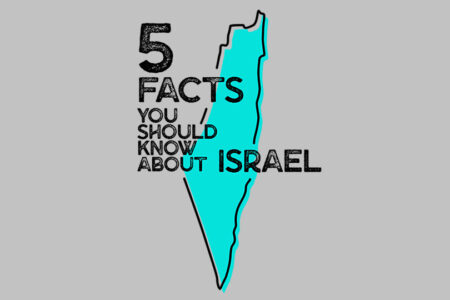My Seven Chapters
If you had to choose seven chapters from Scripture to tell the story of your personal walk with God, could you do it?
Last summer I spoke at a family Bible conference. As I began preparing the messages for the ministry there, I decided to try something unusual and highly personal: telling how I came to faith in Christ from Orthodox Judaism using seven chapters of Scripture.
Although theologians believe the number seven symbolizes perfection, I confess that my reason for choosing seven was not spiritual: I needed seven messages for the conference.
No matter, I found the exercise both formidable and frustrating, yet enjoyable and enlightening. I’d like to share a brief summary with you here.
1. Genesis 3
GOD ANSWERS THE QUESTION, “WHY IS THERE EVIL?”
During my Hebrew school days, we spent much time translating the Torah (Five Books of Moses); and Genesis 3 had a powerful impact on me.
I began to understand the implications of sin entering the world. I saw sin’s origin (Satan) and its allure to Eve, Adam, and mankind. I also could see its devastating consequences on me. Unlike most of my classmates who considered the story of Adam and Eve fiction, I believed it was true. Their sin brought physical and spiritual death and tangibly changed the world: The serpent would crawl on his belly, Eve would bear children in pain, Adam would toil by the sweat of his brow, and the earth would produce thorns and weeds.
Genesis 3 answered all my Why questions: Why sickness? Why greed? Why hate? Why violence? It’s a depressing chapter. But in it lies a word of hope. Verse 15 promises a unique, special person—the “Seed” of the woman—who will crush the serpent’s head while Himself sustaining a bruised heel. Genesis 3:15 is God’s promise of hope in the midst of sin and judgment—the glorious promise of a Redeemer.
At the time, I didn’t know who this person was, but I believed he was Israel’s Messiah. It was years before God removed my blinders, enabling me to understand that Jesus was that Seed.
2. Genesis 12
GOD PROMISES A LAND, A SEED, AND BLESSING
While Genesis 1 through 11 covers the first 2,000 years of general history, chapters 12 through 50 cover 450 years of the history of a particular family—that of the Redeemer.
Chapter 12 explains that God chose a pagan man, Abraham, and commanded him to leave his country and family and go to a land God would show him. By faith, Abraham obeyed, resulting in personal blessing for him and his descendants.
Contained in this unconditional covenant God made with Abraham is God’s promise of a land, a seed, and blessing. Its importance cannot be overstated. It is the fountain from which flow all of God’s redemptive purposes, not only for Israel, but for all mankind. (Later, God changed Abraham’s grandson Jacob’s name to Israel and applied the covenant to all of Jacob’s descendants; 35:10.) God was creating the Jewish people.
Genesis 12 is also the chapter cherished by so many Christians who love Israel and the Jewish people: “I will bless those who bless you, and I will curse him who curses you; and in you all the families of the earth shall be blessed” (v. 3). I am the beneficiary of this promise; and as a believer in Messiah Jesus, I am twice blessed.
3. 2 Samuel 7
GOD PROMISES AN EVERLASTING KING AND KINGDOM
Genesis 12 identified the Redeemer as Jewish. Second Samuel 7 promises He will be the greater Son of King David and will reign and rule forever.
God promised David, “Your house and your kingdom shall be established forever before you. Your throne shall be established forever” (v. 16). The Redeemer was even born in Bethlehem, where David was born.
4. Isaiah 53
THE HUMBLE SERVANT
In Acts 8, an Ethiopian eunuch read “Isaiah the prophet” (v. 28) and asked Philip, an early disciple of Christ, “Of whom does the prophet say this, of himself or of some other man?” (v. 34). That is the ultimate question.
Seven hundred years before Jesus’ birth, Isaiah prophesied, “He was wounded for our transgressions, He was bruised for our iniquities; the chastisement for our peace was upon Him, and by His stripes we are healed” (Isa. 53:5). This passage was key to my coming to Christ. It is an integral part of my testimony, as it is for many Jewish believers.
This “root out of dry ground” (v. 2)—the One who bore “our griefs and carried our sorrows” (v. 4), the One who “opened not His mouth” (v. 7)—is the Seed of the woman (Gen. 3:15), the Jewish son of David (2 Sam. 7:12–16). Yet He also is the humble, sin-bearing sacrifice for my sin. He is the One, my Redeemer and my Lord.
5. John 1
GOD THE CREATOR IS ALSO GOD THE LAMB
The apostle John wrote, “In the beginning was the Word, and the Word was with God, and the Word was God” (Jn. 1:1).
The “Word” in Greek is Logos. In Aramaic, it is Memra. In John’s day, Greek philosophy viewed the Logos as an agent connecting the transcendent divine with humanity. Rabbinic theology taught it was the Memra who was the agent who explains God’s creating, appearing, punishing, speaking to humans, and saving.
Thus, when John began his Gospel account, the Logos/Memra who became flesh spoke decisively and amazingly to both Gentiles and Jews and still speaks today. John the Baptist identified the Logos/Memra as “the Lamb of God who takes away the sin of the world” (v. 29). Jesus Christ, the Lamb of God, is the Logos of God and Word incarnate, a truth difficult to comprehend, yet glorious once believed.
6. Revelation 19
THE VICTORIOUS KING RECLAIMS THE EARTH
How thrilling it will be to hear heaven’s voices saying, “Alleluia! Salvation and glory and honor and power belong to the Lord our God!” (v. 1). In Revelation 19, the Jewish Messiah makes His glorious and victorious appearance on Earth, with His saints behind Him.
He will enter on a white horse (v. 11)—exactly the way I was taught in my synagogue—and “His eyes were like a flame of fire, and on His head were many crowns” (v. 12). His name? “KING OF KINGS AND LORD OF LORDS” (v. 16).
The promised Seed of the woman (Gen. 3)—the Jewish (Gen. 12) Son of King David (2 Sam. 7) and humble sacrifice for humanity’s sin (Isa. 53)—is the Word incarnate (Jn. 1) who is returning to Earth to judge, conquer, and reign.
7. Revelation 21
GOD MAKES ALL THINGS NEW
After Jesus returns physically, He will dwell with His people—exactly as He promised: “I heard a loud voice from heaven saying, ‘Behold, the tabernacle of God is with men, and He will dwell with them, and they shall be His people. God Himself will be with them and be their God’” (v. 3).
He will wipe away all tears. No longer will people die. No longer will there be sorrow or crying. In this chapter He says, “It is done! I am the Alpha and the Omega, the Beginning and the End. I will give of the fountain of the water of life freely to him who thirsts” (v. 6). To which we all can say, “Hallelujah!”
What About You?
After my first message at the conference, a woman said to me, “I don’t like your seven.”
“That’s fine,” I replied. “Choose your seven. I’m sure you’ll like them.” During the week, others shared their seven chapters and told me the exercise was a wonderful challenge. A college-aged woman told me she took all week to work through her seven chapters and was grateful for the things she learned about herself and God.
What about you? Will you take the challenge and choose seven chapters that explain your testimony or walk with God? If you do, I would love to hear from you. Feel free to email your chapters to me at [email protected]. It’s likely that when you finish figuring out your seven, you’ll be closer to the Lord than when you began.









Very good article. I immediately thought of 2 chapters for myself. Thanks for including your email. I think I’ll reflect on this and send you my list of 7 chapters
I loved this message
Here is what I believe. Genesis 12:2-3 is ultimately a blessing to Abraham and his seed, which are those that believe in Jesus the Messiah. Paul says that the spiritual seed of Abraham are those who accept His Son.
Most of the physical blessings that were promised to Israel were contingent if they kept God’s commands. They failed, so God removed His physical blessing. I don’t disagree that Jesus will return and rule in Israel, but only a remnant of the Jews will be saved. The majority of Jews in Israel are secular. If we are to love the Jewish people, it should be because they should embrace their Jewish Messiah, not just because they are God’s physical chosen people.
And although they are back in the land of Israel does not change the fact that they still do not embrace Jesus as their Messiah. Sadly, most of the Jewish people, like the rest of the world, will accept the Antichrist as their long awaited Messiah.
In Jesus, there is neither Jew nor Gentile, neither slave nor free, nor is there male and female.
When Jesus reigns, the Jewish remnant will then become what they were meant to become when mortal Jews will lead the mortal Gentiles to the knowledge of God during the Millennium. Then, and only then will the Jewish believers take their position as doubly blessed.